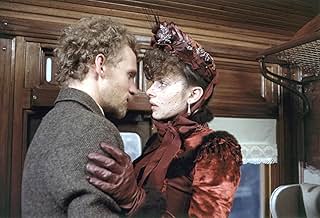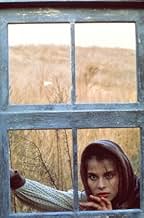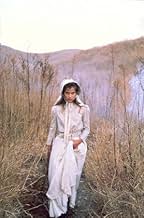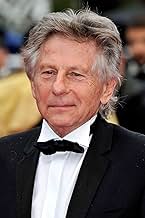IMDb रेटिंग
7.3/10
19 हज़ार
आपकी रेटिंग
एक मजबूत इरादों वाली युवा किसान लड़की दो पुरुषों के स्नेह को आकर्षित करती है.एक मजबूत इरादों वाली युवा किसान लड़की दो पुरुषों के स्नेह को आकर्षित करती है.एक मजबूत इरादों वाली युवा किसान लड़की दो पुरुषों के स्नेह को आकर्षित करती है.
- 3 ऑस्कर जीते
- 16 जीत और कुल 17 नामांकन
Nastassja Kinski
- Tess
- (as Nastassia Kinski)
फ़ीचर्ड समीक्षाएं
This has been my favourite movie since I first saw it in the late 1980s, and I have viewed it probably once a year since that time. My videotape copy was fading and failing, so I was lucky to replace it recently with the Japanese DVD version.
When you compare it to other films made in 1979, it is amazing how little it has "aged". Of course, it is an historical drama, with a "timeless" setting. And yet the cinematography is so assuredly wonderful that the movie is almost as if set in amber.
Many have commented on the score, and it is a pity that this is no longer in issue. Still, there seem to be enough people like myself who are fans of this film, perhaps there is enough of an interest?
While the A and E version was an above-average production, I think Polanski's beats it on almost any characteristic. Polanski's film is a series of tableaux, very few of which do not work well. (One that I find a little bit stupid is the scene where Tess sleeps out in the forest and the deer comes to visit her. Gimme a break!). There are many scenes which, if left in still, look like 19th century portraiture, a la Mary Cassatt or Edgar Degas. The scene where the pedlar comes across Tess at the Crescent Hand! This guy has just stepped out of another century. This is a stunningly visual movie, and perhaps the reason it is so easy to watch time and time again. The dialogue, too, full of the cadences of West Country speech (still there, but disappearing) are an evocation of a lost age. These are hinted at in the scenes showing the modernization of England (the train bringing the milk to market, the threshing machine) which is changing their lives. Tess, and her aristocratic background, are an anachronism, particularly compared with the worldly (and successful) Stokes.
I enjoy the rhythm of the movie, which is rural and slow. Time is marked in slow and languid drips, such as we see with the milk at the dairy farm, and finally with the blood at the boarding house. This is classic story-telling, replete with foreshadowing (particularly Tess' temper and pride). What I enjoyed most is the symmetry of the story-telling, which make it more myth-like, particularly the juxtaposition of the two opening and closing scenes (the dancing of the village girls at sunset, and Stonehenge--which legend has as a circle of giants dancing and frozen by Merlin--at daybreak). Other examples are Alec Durberville's "saving" Tess from a fight with her "rival" and Angel choosing Tess over her rivals on the flooded road.
As you can see, Tess is a movie that replays itself in my mind. Polanski's effort reflects on what I think is one of the greatest 19th century English novels (in my mind, rivaled only by "Middlemarch"), and is a great springboard to further consideration of art and life.
When you compare it to other films made in 1979, it is amazing how little it has "aged". Of course, it is an historical drama, with a "timeless" setting. And yet the cinematography is so assuredly wonderful that the movie is almost as if set in amber.
Many have commented on the score, and it is a pity that this is no longer in issue. Still, there seem to be enough people like myself who are fans of this film, perhaps there is enough of an interest?
While the A and E version was an above-average production, I think Polanski's beats it on almost any characteristic. Polanski's film is a series of tableaux, very few of which do not work well. (One that I find a little bit stupid is the scene where Tess sleeps out in the forest and the deer comes to visit her. Gimme a break!). There are many scenes which, if left in still, look like 19th century portraiture, a la Mary Cassatt or Edgar Degas. The scene where the pedlar comes across Tess at the Crescent Hand! This guy has just stepped out of another century. This is a stunningly visual movie, and perhaps the reason it is so easy to watch time and time again. The dialogue, too, full of the cadences of West Country speech (still there, but disappearing) are an evocation of a lost age. These are hinted at in the scenes showing the modernization of England (the train bringing the milk to market, the threshing machine) which is changing their lives. Tess, and her aristocratic background, are an anachronism, particularly compared with the worldly (and successful) Stokes.
I enjoy the rhythm of the movie, which is rural and slow. Time is marked in slow and languid drips, such as we see with the milk at the dairy farm, and finally with the blood at the boarding house. This is classic story-telling, replete with foreshadowing (particularly Tess' temper and pride). What I enjoyed most is the symmetry of the story-telling, which make it more myth-like, particularly the juxtaposition of the two opening and closing scenes (the dancing of the village girls at sunset, and Stonehenge--which legend has as a circle of giants dancing and frozen by Merlin--at daybreak). Other examples are Alec Durberville's "saving" Tess from a fight with her "rival" and Angel choosing Tess over her rivals on the flooded road.
As you can see, Tess is a movie that replays itself in my mind. Polanski's effort reflects on what I think is one of the greatest 19th century English novels (in my mind, rivaled only by "Middlemarch"), and is a great springboard to further consideration of art and life.
This film was an almost exact replication of Thomas Hardy's novel "Tess of the d'Urbervilles". It's so rare to watch a film after reading the novel and not be disappointed by it, but this film didn't disappoint in any way.
Details, such as the whiteness of the maids' dresses, the sound of milk squirting into a bucket, the sloshing mud of a wet English turnip field, and the glint of adoration in the eyes of the young lovers -- all came gloriously to life as if fresh off the pages of the book.
I highly recommend this film for anyone who enjoys a good old fashioned Victorian love story.
Details, such as the whiteness of the maids' dresses, the sound of milk squirting into a bucket, the sloshing mud of a wet English turnip field, and the glint of adoration in the eyes of the young lovers -- all came gloriously to life as if fresh off the pages of the book.
I highly recommend this film for anyone who enjoys a good old fashioned Victorian love story.
In this adaptation of the Hardy novel, a peasant girl who may be descended from a noble family encounters romance and tragedy in 19th century England. Meticulously directed by Polanski, this epic drama unfolds quite leisurely but does not drag. The English countryside is beautifully captured, with the cinematography adding a haunting quality to the barren landscape, an effect further enhanced by the evocative score. Perhaps she does not faithfully embody the strong-willed heroine of the novel, but Kinski (resembling a young Ingrid Bergman) looks exquisite and effectively conveys a sense of melancholy in a star-making performance.
Polanski's 'Tess' is rich with images and poetry. To start with, the director really does make use of the countryside and life in the country during the late 1800s. Those themes are presented as characters themselves. And, coupled with the fitting score it gives a feel of what the time may have been like. Along with some fine cinematography, many of the shots linger on the beautiful and yet sad countryside.
The pacing is exceptionally well maintained. 'Tess' is longer than the traditional 100 minute flick but not for a moment does it feel as though it's lagging or dragging in pace.
Another strength of the film is its subtlety. For example, to the director's credit, there's an outstanding sequence of how murder is implied just with a few drops of blood. Even the finally sequence (beautifully done) implies Tess's fate (before the epilogue clarifies it). 'Tess' touches on some heavy themes such as sexism, poverty and betrayal but it doesn't preach about them. Rather it tells the story of a strong-willed, devoted and kind woman who was faulted for being beautiful.
Moreover, the characters are brilliantly layered. The screenplay has safely avoided caricatures). A very young Nastassja Kinski is incredible in one of her early roles. Her restrained performance and gestural expressions are remarkable. Peter Firth does a fine job too. They are supported by very good performers.
This is easily one of Polanski's finest: his most subtle and poetic films. A treat to watch.
The pacing is exceptionally well maintained. 'Tess' is longer than the traditional 100 minute flick but not for a moment does it feel as though it's lagging or dragging in pace.
Another strength of the film is its subtlety. For example, to the director's credit, there's an outstanding sequence of how murder is implied just with a few drops of blood. Even the finally sequence (beautifully done) implies Tess's fate (before the epilogue clarifies it). 'Tess' touches on some heavy themes such as sexism, poverty and betrayal but it doesn't preach about them. Rather it tells the story of a strong-willed, devoted and kind woman who was faulted for being beautiful.
Moreover, the characters are brilliantly layered. The screenplay has safely avoided caricatures). A very young Nastassja Kinski is incredible in one of her early roles. Her restrained performance and gestural expressions are remarkable. Peter Firth does a fine job too. They are supported by very good performers.
This is easily one of Polanski's finest: his most subtle and poetic films. A treat to watch.
Tess had a lot going for it, a wonderful book and a director that was responsible for masterpieces like Chinatown, Repulsion and Rosemary's Baby. Tess didn't quite live up to the promising potential it did have and I don't consider it one of Polanski's masterpieces. However it is a commendable film and adaptation(even if I do prefer the 2008 BBC series) and better on re-watch than when I saw it a couple of years back and didn't care at all for it. The film is overlong, and while the pace is purposeful considering the book's complexity there are times where it does get a bit too languid. On the other hand, visually it is stunning with evocative scenery and photography. The music is also resolutely haunting, the scripting thought-provoking and literate and the story having its necessary pathos as well as being devastating and powerful in equal measure. The denouncement with Stonehenge as the backdrop is just stunning. The characters are not as complex as in the book or the series but are still interesting and emphatic. Nastassja Kinski does have moments where she is a little flat, but on the whole it is a very moving performance. Peter Firth is suitably subtle as Angel Clare and Leigh Lawson's menacing Alec comes close to stealing the film. Polanski's direction is exemplary. All in all, has much to admire but falls flat of being a truly outstanding movie. 7/10 Bethany Cox
क्या आपको पता है
- ट्रिवियाThe film's opening dedication at the start of the film states: "For Sharon". Roman Polanski dedicated this movie to his late wife, Sharon Tate, who was killed in 1969 by the Manson Clan. Before Tate's death, she had read the film's source novel by Thomas Hardy and was convinced that her husband would one day make a great film based on the novel, with the hope that she would star in it. Movie was released to the theaters exactly 10 years after her untimely death.
- गूफ़At the beginning of the final sequence, set at Stonehenge, someone's head can be seen at bottom-left.
- इसके अलावा अन्य वर्जनThe film was first released to German cinemas uncut with a running time of 184 minutes. As the audience reaction was far from overwhelming the distributor decided to re-cut and re-release the film in a more "accessible" 134 minutes version. But at least one of the original prints had survived and was shown here at the local art house years later.
- कनेक्शनFeatured in The 38th Annual Golden Globe Awards (1981)
टॉप पसंद
रेटिंग देने के लिए साइन-इन करें और वैयक्तिकृत सुझावों के लिए वॉचलिस्ट करें
- How long is Tess?Alexa द्वारा संचालित
विवरण
- रिलीज़ की तारीख़
- कंट्री ऑफ़ ओरिजिन
- भाषा
- इस रूप में भी जाना जाता है
- Cô Gái Đức Hạnh
- फ़िल्माने की जगहें
- उत्पादन कंपनियां
- IMDbPro पर और कंपनी क्रेडिट देखें
बॉक्स ऑफ़िस
- बजट
- $1,20,00,000(अनुमानित)
- US और कनाडा में सकल
- $2,00,93,330
- दुनिया भर में सकल
- $2,01,01,247
- चलने की अवधि
- 3 घं 6 मि(186 min)
- रंग
- पक्ष अनुपात
- 2.35 : 1
इस पेज में योगदान दें
किसी बदलाव का सुझाव दें या अनुपलब्ध कॉन्टेंट जोड़ें






















